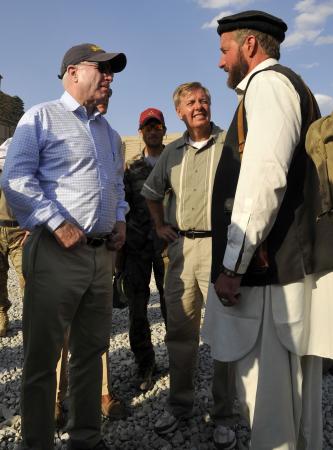[by Mark Safranski, a.k.a. “zen“]

American Spartan: The Promise, the Mission, and the Betrayal of Special Forces Major Jim Gant by Ann Scott Tyson
Was just sent a review copy of American Spartan courtesy of Callie at Oettinger & Associates which tells the story of Major Jim Gant, the special forces officer and AfPak hand who pushed hard for a controversial strategy in Afghanistan based on arming and training loyalist paramilitaries out of Afghan tribesmen ( or whatever localist network would suffice when tribal identity was weak or absent). I am looking forward to reading this book for a number of reasons.
Long time readers may recall Gant coming to wider attention with his paper, One Tribe at a Time with an assist from noted author Steven Pressfield, where he called for a campaign strategy against the Taliban from “the bottom up” using “the tribes” because the current top down strategy of killing insurgents while building a strong, centralized, state would never work – the war would just drag on indefinitely until the US grew tired and quit Afghanistan ( as is happening….now). Gant, who forged a tight relationship with Afghan tribal leader Noor Azfal ,won some fans with his paper in very high places, including SECDEF Robert Gates and Generals Stanley McChrystal and David Petraeus who gave him some cover to implement his ideas but he also faced formidable resistance and criticism. Academic experts were particularly incensed by Gant’s broad-brush use of “tribes” to cover a wide array of local networks and Afghan identities and that “tribes” were a term modern anthropology held in deep disdain ( RAND’s David Ronfeldt pointed out that while these networks are not historical tribes they are certainly “tribal” in terms of behavior patterns) while the government of Mohammed Karzai and its American boosters were bitterly hostile to any strategy that might arm locals outside Kabul’s direct control.
 It was also a risky strategy. Loyalist paramilitaries are often very effective in a military sense – as happened in Colombia when the government tolerated and encouraged private militias to make war on FARC and the ELN and badly mauled the Communist insurgents – but they are inherently unreliable politically. Paramilitaries can also ”go off the reservation” – this also happened in Colombia – and commit atrocities or become criminal enterprises or engage in warlordism and have to be reined in by the government. All of these were particular risks in the context of Afghanistan where warlordism and drug trafficking had been particularly acute problems even under Taliban rule. On the other hand, warlordism and drug trafficking has hardly been unknown in the ANA regular units and national police and is hardly the province only of irregulars.
It was also a risky strategy. Loyalist paramilitaries are often very effective in a military sense – as happened in Colombia when the government tolerated and encouraged private militias to make war on FARC and the ELN and badly mauled the Communist insurgents – but they are inherently unreliable politically. Paramilitaries can also ”go off the reservation” – this also happened in Colombia – and commit atrocities or become criminal enterprises or engage in warlordism and have to be reined in by the government. All of these were particular risks in the context of Afghanistan where warlordism and drug trafficking had been particularly acute problems even under Taliban rule. On the other hand, warlordism and drug trafficking has hardly been unknown in the ANA regular units and national police and is hardly the province only of irregulars.
Another reason I am interested in this book is the subtitle’s accusation of “betrayal” which I infer comes out of the long institutional cultural and chain of command clashes of bureaucratic politics between Big Army and Special Forces and Special Operations Forces communities. The long history in the big picture is that many general purpose force commanders do not know how to use these troops to best strategic effect and sometimes resent the autonomy with which they operate ( a resentment returned and repaid at times with a lack of consultation and ignoring of local priorities in operational planning).
The author, Ann Scott Tyson is a long-time and experienced war reporter who embedded extensively with US troops in Afghanistan and Iraq. She is also married to her subject which should make for some interesting analysis when I review the book.



